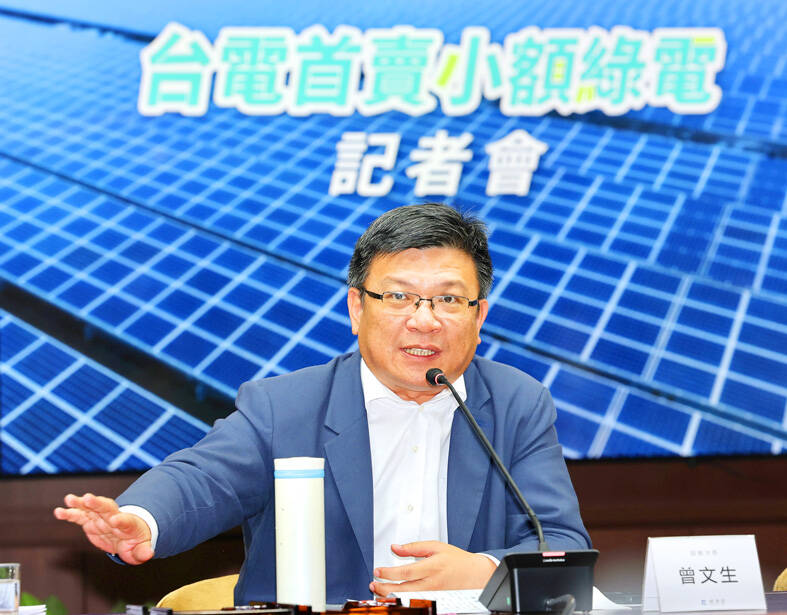Power plants in Taiwan could be turned into energy parks that use decarbonization technology to help the nation produce electricity more efficiently, Deputy Minister of Economic Affairs Tseng Wen-sheng (曾文生) said on Friday.
Tseng, who doubles as chairman of Taiwan Power Co (Taipower, 台電), said during a seminar about electricity that the power industry must improve on automation, digitalization and availability (the amount of time equipment is available for production) to meet the needs of an electrified society.
An electrified society requires the use of electricity in a more efficient manner, and it would test Taipower’s ability to employ a wider variety of energy sources to produce, transmit and distribute power, Tseng said.

Photo: CNA
With the nation expected to use increasingly more green energy, the company expects by the Lunar New Year in 2030 there could be periods in which the amount of power generated exceeds overall demand, Tseng said, adding that there is a need to develop a plan to ensure electricity is not wasted.
Under President Tsai Ing-wen (蔡英文), Taiwan aims to generate 50 percent of its electricity with natural gas by 2030, followed by renewable energy at 27 to 30 percent and coal at 20 percent.
Energy storage systems or using wind power to produce hydrogen could be two ways to meet the challenge of excess power production, Tseng said.
“Low carbon energy parks” is an idea that the company has proposed for future natural-gas-based power plants, incorporating both existing gas-fired generator sets, and wind power and new technologies such as hydrogen-producing stations, along with carbon capture and storage, he said.
Power plants in Taichung, Miaoli County’s Tongsiao Township (通霄) and Taoyuan’s Datan Borough (大潭) — all located near offshore wind power farms — would likely be pilot project candidates, Tseng said.

When an apartment comes up for rent in Germany’s big cities, hundreds of prospective tenants often queue down the street to view it, but the acute shortage of affordable housing is getting scant attention ahead of today’s snap general election. “Housing is one of the main problems for people, but nobody talks about it, nobody takes it seriously,” said Andreas Ibel, president of Build Europe, an association representing housing developers. Migration and the sluggish economy top the list of voters’ concerns, but analysts say housing policy fails to break through as returns on investment take time to register, making the

‘SILVER LINING’: Although the news caused TSMC to fall on the local market, an analyst said that as tariffs are not set to go into effect until April, there is still time for negotiations US President Donald Trump on Tuesday said that he would likely impose tariffs on semiconductor, automobile and pharmaceutical imports of about 25 percent, with an announcement coming as soon as April 2 in a move that would represent a dramatic widening of the US leader’s trade war. “I probably will tell you that on April 2, but it’ll be in the neighborhood of 25 percent,” Trump told reporters at his Mar-a-Lago club when asked about his plan for auto tariffs. Asked about similar levies on pharmaceutical drugs and semiconductors, the president said that “it’ll be 25 percent and higher, and it’ll

NOT TO WORRY: Some people are concerned funds might continue moving out of the country, but the central bank said financial account outflows are not unusual in Taiwan Taiwan’s outbound investments hit a new high last year due to investments made by contract chipmaker Taiwan Semiconductor Manufacturing Co (TSMC, 台積電) and other major manufacturers to boost global expansion, the central bank said on Thursday. The net increase in outbound investments last year reached a record US$21.05 billion, while the net increase in outbound investments by Taiwanese residents reached a record US$31.98 billion, central bank data showed. Chen Fei-wen (陳斐紋), deputy director of the central bank’s Department of Economic Research, said the increase was largely due to TSMC’s efforts to expand production in the US and Japan. Investments by Vanguard International

WARNING SHOT: The US president has threatened to impose 25 percent tariffs on all imported vehicles, and similar or higher duties on pharmaceuticals and semiconductors US President Donald Trump on Wednesday suggested that a trade deal with China was “possible” — a key target in the US leader’s tariffs policy. The US in 2020 had already agreed to “a great trade deal with China” and a new deal was “possible,” Trump said. Trump said he expected Chinese President Xi Jinping (習近平) to visit the US, without giving a timeline for his trip. Trump also said that he was talking to China about TikTok, as the US seeks to broker a sale of the popular app owned by Chinese firm ByteDance Ltd (字節跳動). Trump last week said that he had